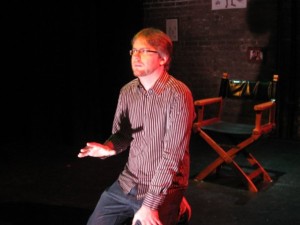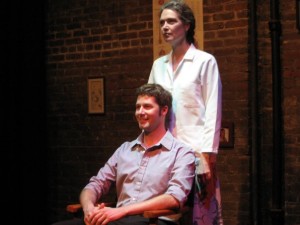category: full-length play
genre: drama
running time: ninety minutes
setting: a small American town within driving distance of a major city
period: contemporary
characters:
MATHEW, 33, kind of Catholic?
SIMON, his boyfriend, sort of Jewish?
BRIAN, Mathew’s dad, believes in God!
RUTH, Brian’s sister, believes in The Bible!
CLAIRE, Brian’s doctor, closet theist.
JUDITH, Brian’s parapsychologist, closet atheist.
story:
Mathew Drake falls off the house one day while attempting to clean his gutters and is rushed to the hospital with a concussion. A day later he dies, unexpectedly, but three days after that, while awaiting embalming at the funeral parlor, he comes back to life, mysteriously without any scars, witnessed only by his boyfriend, Simon, who promptly faints. Subjected to constant medical observation by his doctor, Claire, Mathew returns home and attempts to preserve his sanity and his relationship with Simon, while also repairing his relationships with his dead-beat new-age preacher dad and his conservative Bible-college professor aunt. As time progresses things fragment on the romantic angle even as Mathew is able to come to grips with his experience, thanks to a psychologist, Judith, whose focus is on people with near-death experiences. As Thanksgiving approaches, the couple decide to host a holiday gathering they hope will put into place the beginnings of a coherent exploration of who we are and why we’re here and how we live with our own mortality.
author’s comments:
Judith came first. She was born in a play called The Feast of Fog that contained her, an excellent speech in the final scene that found its way into later drafts of The Exiled, and nothing else worth saving. I scraped it the moment I finished the first draft back in 2003, and have never thought of it since (except for the title, which I love). But Judith refused to be forgotten, and when the idea for this play first came to shuddering life with alarming speed back in January of 2006, she shoved her way to the front of my line of alternate personas and took her rightful place as the narrative filter for Mathew, the latest in a long line of characters I’ve come to see as frequent inhabitants of my work: reluctant visionaries, albeit, in this case, a more modest and soft-spoken version of the earlier more out-spoken (and neurotic) models (Dylan, Adam, Vincent). Over the course of three days, including two full work-days which my then boss, Tracy Rapplin, graciously allowed me to spend working on my script instead of on my job, the rest of the play emerged, the other characters appearing one by one, and finally coming out in one final burst that resulted in a first draft ten pages longer than, but otherwise exactly the same as, the play I was to workshop before audiences in San Francisco almost two years later. For ten years after that then, with the exception of Simon’s final monologue (which I tinkered with at the urging of Alison Luterman) the play sat untouched, but never feeling done to me. The two primary plotlines, one philosophical, one personal, were not easy bedfellows, but I couldn’t seem to marry them well. And then in 2017 I set myself the challenge of re-approaching the play, and early in the year did another revisioning, five pages of cuts and the sequential switching of four scenes. I had a reading, and it was in my living room that Justin Gillman, the actor reading Mathew that night, suggested I consider a small town setting, and find ways to not only make the Mathew/Simon story more vital, but bring us deeper into the lives of all the characters. Which is when it hit me to make Ruth and Brian part of Mathew’s family, and to bring everything to a head at America’s most notoriously debate ridden holiday: Thanksgiving. My style of theater has often been called “confessional” and “romantic” and I think the original version of this piece was the apex of those two forms in that it was nothing but one character after another disclosing their deepest thoughts and observations and yet it ended (or did it?) as filled with mystery as it was at the beginning. The allegorical tools of romantic philosophy, the candle and the mirror, were both utterly frustrated in their function and yet they were essential to the construction of the show and its core conceit, namely being a veiled farewell letter to a brief but beautiful love affair that both challenged and affirmed everything I believed, in addition to teaching me a great deal about the nature of joy and faith. But the shadows obscured the mirror that this play holds up to my life, and the light that flickers from the candle brought to dispel them only created new shadows in different directions, and while Mathew and Simon were engaged in a story symbolic of my own neither one is me nor takes anything more than superficial (albeit, important) details from real people in my life, and the characters thus felt distant- symbolic but not human. If some of the romanticism has been lost with more recent drafts as the play turned more in the direction of a domestic drama, a greater deal of humanity has been gained, which I think is better. There’s a lot to chew on in this piece- but it goes down easier when you feel like you’re engaging the meat at the table of a friend.
Productions:

No Nude Men Productions, October 12, 13, 19, 20, 26, 27 & November 2, 3, 9, 10, 2007, at the EXIT Theatre in San Francisco, California. Directed by Stuart Bousel; Assistant Directed by Rik Lopes; Lighting by James Tinsley; Design by Gregorio de Masi; Publicity by Margery Fairchild. Cast: Ryan Hebert (Mathew), Kirsten Broadbear (Judith), Jason Peelle (Simon), Christine Rodgers (Claire), Hector Osorio (Brian), Kendra Arimoto (Ruth)

Staged Readings:
No Nude Men Productions, October 21, 2017, part of the SF Olympians Festival at the EXIT Stage Left in San Francisco, California. Directed by Juliana Lustenader. Cast: Simone Alexander (Ruth), Erika Bakse (Judith), Ittai Geiger (Mathew), Deborah Murphy (Stage Directions), Dylan O’Connor (Simon), Lora Oliver (Claire), Karl Weiser (Brian)
Theatre Rhinoceros, March 8, 2022 at the Theatre Rhino in San Francisco, California. Directed by Stuart Bousel. Cast: Mikey Conner (Mathew), Laura Domingo (Claire), Valerie Fachman (Ruth), Kyle Goldman (Simon), Nicole Odell (Judith), Ron Talbot (Brian)
